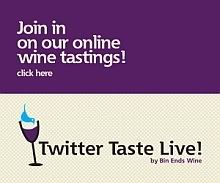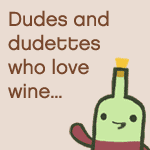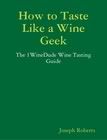 (images: wpsignsystems.com, organic.lovetoknow.com)
(images: wpsignsystems.com, organic.lovetoknow.com)
Those of you who have been following the Dude's blog know that when it comes to organic wines I have been, let's just say, less than kind in the past on the quality and viability of these products.
To provide yet another perspective in my ongoing love/hate affair with all things organic. my partner in crime Jason Whiteside has offered up some comments on the organic trends impact for wine consumers.
Jason fully acknowledges the marketplace trends towards organic products, even though he is not influenced by it himself per se (according to Jason, "I am not a vegan. Whatever the opposite eating style to vegan is, that is what I am.").
Organic-minded consumers should be aware of the hidden dangers in their wine bottles. According to Jason:
"Along with the wave of social food consciousness, it is natural to wonder about the wine we drink. Is it organic? Is wine OK for vegans to drink? What do we really know about the contents of any given bottle? Consumers who are sensitive to the use of animal products should know why and how animal products are used in the manufacture of wine. Eggs whites, isinglass (the powdered swim bladders of fish), and other proteins are used in the fining process, which helps make a wine clear."
"Often times, when wine is made, it has a hazy or cloudy appearance from suspended particles. Nobody wants to drink hazy wines, for most of us are rightfully programmed to believe a good wine should be clear and bright. So the winemaker will use a carefully measured amount of protein to help remove the haze. This works because the protein carries an electrostatic charge opposite to the particles in the haze. They cling to each other, and fall out of the wine as sediment. The clear wine is then racked off the sediment, which means that for practical purposes there is no clarifying agent (egg whites) left in the bottle."
For those who are over-the-top-serious about their organic shopping, even these fining procedures may not be enough:...
"But, who really knows if there is absolutely none left? Testing for that would be more expensive than it is worth." All is not entirely hopeless for these consumers, however: "As a consumer, it is relatively easy to find a list of wines that are either unfined or fined without animal products. This website lists vegan wine, and I have found it to be very helpful: http://vegans.frommars.org/wine. I recommend the wines from Rosenblum (especially their Petit Syrah) and Houghton Chardonnay, in particular."
All is not entirely hopeless for these consumers, however: "As a consumer, it is relatively easy to find a list of wines that are either unfined or fined without animal products. This website lists vegan wine, and I have found it to be very helpful: http://vegans.frommars.org/wine. I recommend the wines from Rosenblum (especially their Petit Syrah) and Houghton Chardonnay, in particular."
As for the current state of organic winemaking, Jason leans towards my assessment that good examples of these wines are harder to come by (but well worth the effort once you do finally get your hands on them):
"For consumers who look for organic or vegan wines, my hope is that more skilled winemakers take up the challenge of green winemaking. It is not an easy undertaking. Sulfur dioxide buys a winemaker a lot of time by keeping the grapes fresh, and fresh grapes mean better wine. If you want to see how fast harvested fruit starts to spoil in your own home, cut an apple in half, and see how long it takes to start to turn brown. The 'browning' is the effect oxygen has on fruit; sulfur dioxide protects against this. It will be difficult for winemakers to forever put away their chemicals, eggs, and fish bladders, and I for one would not ask them to. But, for those to whom this matters, know that quality wines are being made without the extra stuff. You just have to go out and find them."
Cheers!
Fresh Takes on Organic Wine
Related Articles (Sphere)
Vinted on
Monday, March 31, 2008
Email This
![]()
Labels: 2WineDudes, biodynamic, Jason Whiteside, organic wine, wine tips
Subscribe to:
Post Comments (Atom)



























6 comments:
Joe,
Wow, OK. I am in now way near anything that resembles Vegan. But that is a LONG way from Organics!
I am HUGELY in favor of organics and whole, real foods as opposed to processed, hormone injected, polluted stuff. I say this as someone whose been able to stave off Type-2 Diabetes simple through a well researched diet and athletic training.
Organics just represent a more natural way of growing food and such without man-made additives. And "organic" people are just looking for unprocessed foods (because many of the things that manufacturers do to the food strip it of some vital nutrients and fatty acids that humans require).
Vegans shun all things animal. That is IMMENSELY unhealthy. Humans didn't evolve from plant eating animals and we didn't have grains until maybe 3-5000 years ago. So not eating any animal products is a political statement and not a health decision and I'll go toe-to-toe with anyone who tries to convince me otherwise.
Don't lump "organics" with "vegan". In fact, I hope when the little girl is drinking regular milk you take the time to look at what goes into whole milk. When you're fending for someone who relies on you 100% and loves you unconditionally you look at these things with a whole new perspective. You need to understand what those bovine growth hormones will do to you growing child and what the chemicals and pesticides can do to a person with a brand new immune and lymphatic system and if you can afford the extra money get the organics.
As for wine? Try Sky Saddle Zin - organic and one of the only organics that I've tried that I can say clearly stands up to other wines. Now, what may happen with the organics is that consistency from vintage to vintage in terms of quality may not be there as things oxidize faster. But thats a guess.
Cheers!`
Well said, Joel.
I've also been able to treat some medical conditions (cholesterol) through diet and exercise alone, so I understand the importance of the distinction. And trust me, we're getting the little one onto breast milk as soon as we can! :-)
Hey Daddy-O,
I'm with Joel. At least in Northern California, we have access to organic, natural, etc. products to supply a great portion of what goes into our bodies. It is a great relief and the less processed, the better.
However, I must get on the soap box by pushing some of the more orthodox members of the Organic Taliban off it first. The majority of sulfur which is used in wine-making is an organic product. We also use copper sulfate which is a natural mineral that comes from the earth. These are no more non-organic than the refined organic supplements that are sold in Whole Foods for colon cleansing!
Given your Lorelai's recent diaper adventures, you are familiar with this process!
Anyway, as you explained so well when you talked about browning, Sulfur is an anti-oxidant. What does that mean? It protects teh wine by binding to oxygen molecules . This means that "Free So2" dissapates very quickly and by the time you pour your glass the vast majority of sulfur has broken down into other compounds. Sulfur is organic and only a tiny portion of the population is even mildly sensitive to Sulfur. Most who think they are are actually reacting to the histamines in tannin.
Sorry. Let me get off the soap box before i bust a vein. Great posting. Kiss the kid g'night for all of us.
Thanks, Patrick. Yes, I am familiar with all things diaper-related at the moment! :-)
I also hear you about the sulfur misconceptions. I've posted about that before, I get asked regularly about sulfur-free wines (which usually gets a response from me like "only the Easter Bunny can deliver a sulfur free wine to your door... because they basically don't exist).
Cheers!
Hello Joe,
Thank you for your blog. And congratulations on the baby!
I am not a grower but a taster. I don't mind haze in a wine.
Nature needs to be protected against man's works. This can be done with certification. The organic labels are lacking but we can hope that labelling becomes more stringent. This has been the trend with electrical appliances and chemical "goods" -- over decades. We can help by criticizing what's done -- as you do.
We could push for having the wine label list the ingredients that went into the wine.
I agree with Jason Whiteside that 'fresh grapes mean better wine'. Yet I would disagree that 'sulfured grapes mean better wine' as Jason implies. Here is a tool for going out and finding low-sulfur or unsulfured wines.
(No need to mention Talibans: nobody is forcing anybody here.)
This issue of ecology or health can be separated from that of taste -- for which we have our palates, critics, some retailers and the AOC system. On this I agree with you and joelvincent: quality varies between vintages and between vintners. This unreliability is more due to winemaking than to organic farming -- in my tasting experience.
Thanks, Felicien!
Excellent comments. Your point about winemaking being ultimately responsible for quality is, I think, the key thing - it comes down to whether or not a winemaker wants to make the best wine possible. That can be done organically (or not) - Frog's Leap, for example, makes very good wine and uses (mostly) organic & biodynamic practices.
Cheers!
Post a Comment